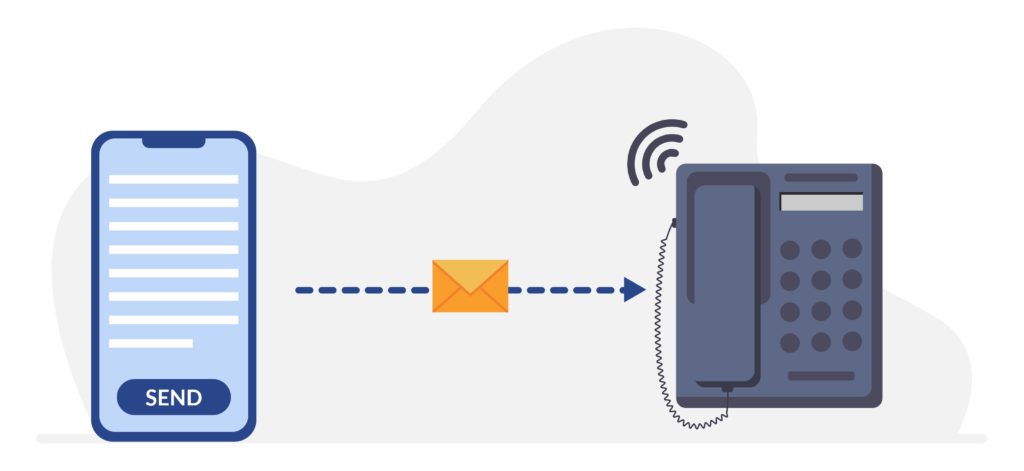
Landline Texting is a wonderful resource for your business to stay in touch with customers, but there are some guidelines you should follow to show proper texting etiquette and professionalism.
Whether you’re just getting started with business texting, or you’ve been doing it for awhile, it’s easy to forget some of the important guidelines that every business should follow when it comes to text message communications with their clients and customers.
Luckily, services like Text My Main Number, make it easy and affordable to set up a professional business text messaging service that your customers will find fun and useful.
In this post, we’ll go through a few things that you should be sure to do if you use business texting.
1. Get consent to text
Before you sign your clients or customers up for your text message announcements, be sure they know about your text messages and agree to receive messages from you. If you don’t get consent beforehand, you could be sending them unwanted information, or spam. Businesses that send spam could be fined or violating federal communications regulations.
You can ask your customers when they purchase a good or service with your company if they would like to receive future text messages from your business. You can also give customers the opportunity to sign up to receive text messages on your website or branded social media platforms.
If a customer sends you a text, you do not need to get verbal or written permission to text with that person since you can reasonably imply that they want you to text them.
2. Give your customers a clear opt-out method
Sometimes people change their minds, move away, or no longer need to receive text messages from your business. In case that happens, be sure you give your customers a clear and effective way to opt out of receiving messages from you in the future. The easiest way to provide an opt out method this by allowing recipients to reply “Stop” to a text, which should prompt you to remove their phone number from your contact list.
With Text My Main Number, mobile users who reply “STOP” to a message are automatically placed on a do-not-contact list. If a business does send a group text to that user’s number, the message is automatically not sent to that user.
3. Don’t share overly personal information via text
Be sure that your text communications do not include overly personal information about your clients, such as their full address, credit card numbers, social security numbers, or health information. Although texting is a secure way to communicate, it is in everyone’s best interest to avoid sharing sensitive information unless it’s absolutely necessary.
4. Make sure your texts fulfill a specific mission
Before you hit send, think about why it’s a good idea for your business to be sending that mass text message out. Are you announcing an important special? Is there a big change happening with your company that you think every customer or client should know about? If you think that the message will be useful for the majority of its recipients, go ahead and send it. However, if the message is best suited for more of a specific audience, think about creating sub-lists of contacts so you can tailor messages to certain groups of customers and clients.

5. Respond to business texts in a timely manner
The phone works both ways when it comes to landline texting. Always be sure that you pay attention to the messages you receive, and respond to messages as soon as possible. Responding to text messages promptly lets people know that their text message went through and that their issue is being addressed.
Many business text messaging platforms, like Text My Main Number, offer a variety of options for you to create auto-reply messages for certain times of day or in response to messages that contain specific keywords. For example, someone can text, “What are your hours?” Instead of typing the response out yourself, you can have an automated message respond to give them your hours and perhaps a link to your website for more information.
6. Keep your messages consistent
Remember that every text message you send from your business’s main number is a reflection of you and your company. You want to clearly present your business’s brand, provide functional links, timely information, and maintain a professional demeanor and tone. If you tell your customers that they can expect daily or weekly texts from you to give them a specific piece of information, be sure you follow through and send those texts when you say you will. With Text My Main Number, you can create text message templates and schedules to make it easier to follow a consistent schedule and preplan your messages ahead of time.
7. Keep text messages short
Your text messages should be short and easy to read. A general rule of thumb is to keep messages shorter than 160 characters. Keeping your text messages short also helps you keep the message focused on one important topic or announcement, so you’re communicating clearly with your customers. Keep in mind that your clients or customers might be busy or distracted when they receive a text, so it’s best to keep messages short enough to read in a few seconds. You can also include abbreviated URLs to direct your customers to a link with more complete information.
In conclusion
Sending unwanted or unprofessional text messages from your business’s main phone number can damage your reputation and result in steep fines.
Landline texting should be offered as an added convenience for your customers rather than an annoyance that they don’t want. Always use your best judgment when sending out text messages and be sure to proofread your texts before hitting send. Also, find a good way to manage an up-to-date contact list that makes it easy to add and remove phone numbers.
You can learn all about how landline texting can work for your business at the Text My Main Number blog.


